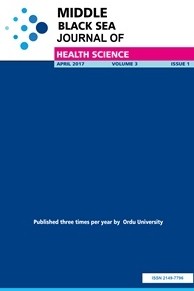The Current Use and the Evolution of Erythrocyte Sedimentation Rate Measurement
The Current Use and the Evolution of Erythrocyte Sedimentation Rate Measurement
Objective: The golden standard for measuring erythrocyte sedimentation rate (ESR) is the Westergren method. Some other methods for measuring ESR have become available in the recent decades. They differ from a modest modification of the Westergren method to very different methodologies. Even though the methodologies of these tests are different the results of them are assessed as the same test by clinicians. Therefore the bias reasoned by different methodology has caused misinterpretation of the patients by clinicians. The comparison and harmonization of this method will provide a standardization and same interpretation for ESR.Methods: The golden standard method for measuring ESR which is called Westergren Method and two prototypes of the remaining methods were chosen for comparison. Three different group of patients were were assessed with three different methods in this study. Results: The monitorization of three samples were observed for 60 minutes. There was no correlation detected depending on the time after the monitorization had started. Hence the adjustment of the results were collected after 20 or 30 minutes for simulating 60 minutes were found significantly different than the classical Westergren method. The detected bias between the adjustment of the earlier result to one hour and the classical method is not always different than the classical method. The sample results were found significantly different in comparison to two methods for all selected patient groups. Conclusion: There is no sedimentation algorithm detected in ESR monitorization process. Therefore the observed bias is thought to be caused by the adjustment of the earlier results to one hour. The adjusted results of 30 minutes were found to be significantly similar compared to the adjusted results of 20 minutes. The results of the capillary photometric kinetic method were found unbiased with the classical Westergren method and compatible with the clinical observations.
Keywords:
erythrocyte, sedimentation rate, laboratory hematology, laboratory standards, recommendations westergren,
___
- 1. Batlivala SP. Focus on diagnosis: the erythrocyte sedimentation rate and the C-reactive protein test. Pediatr Rev. 2009;30(2):72-74.
- 2. Janson L, Tischler M. The Big Picture: Medical Biochemistry. New York, NY: McGrawHill; 2012.
- 3. A. Kratz1, M. Plebani, M. Peng, Y.K. Lee, R. McCafferty, S.J. Machin, ICSH recommendations for modified and alternate methods measuring the erythrocyte sedimentation rate. Int J Lab Hem. 2017;39:448–457.
- 4. Colombet I, Pouchot J, Kronz V, et al. Agreement between erythrocyte sedimentation rate and C-reactive protein in hospital practice. Am J Med. 2010;123(9):863.e7-13.
- 5. Litao MK, Kamat D. Erythrocyte sedimentation rate and C-reactive protein: how best to use them in clinical practice. Pediatr Ann. 2014;43(10):417-420.
- 6. Xia D, Samols D. Transgenic mice expressing rabbit C-reactive protein are resistant to endotoxemia. Proc Natl Acad Sci USA. 1997;94(6):2575-2580.
- 7. Grzybowski A, Sak JJ. Who discovered the erythrocyte sedimentation rate? J Rheumatol. 2011;38(7):1521-1522; author reply 1523.
- 8. Westergren A. The technique of the red cell sedimentation rate. Am Rev Tuber. 1926;14:94-101.
- 9. Jurado RL. Why shouldn't we determine the erythrocyte sedimentation rate? Clin Infect Dis. 2001;33(4):548-549.
- 10. Olshaker JS, Jerrard DA. The erythrocyte sedimentation rate. J Emerg Med. 1997;15(6):869-874.
- 11. Henry's Clinical Diagnosis and Management by Laboratory Methods 21 Editions
- 12. Ahmed YF, Abbag FI, Al-Qahtani JM, Ghazali BM, Abolfotouh MA. Erythrocyte sedimentation rate during steady state, painful crisis and infection in children with sickle cell disease. Saudi Med J. 2000;21(5):461-463.
- 13. Miller A, Green M, Robinson D. Simple rule for calculating normal erythrocyte sedimentation rate. Br Med J (Clin Res Ed). 1983;286(6361):266.
- 14. Piva E, Pajola R, Temporin V, et al. A new turbidimetric standard to improve the quality assurance of the erythrocyte sedimentation rate measurement. Clin Biochem. 2007;40:491-495.
- 15. Plebani M, De Toni S, Sanzari MC, et al. The TEST 1 automated system: a new method for measuring the erythrocyte sedimentation rate. Am J Clin Pathol. 1998;110:334-340.
- 16. Romero A, Munoz M, Ramirez G. Length of sedimentation reaction in blood: a comparison of the TEST 1 ESR system with the ICSH reference method and the Sedisystem 15. Clin Chem Lab Med. 2003;41:232-237.
- 17. Plebani M, Piva E. Erythrocyte sedimentation rate: use of fresh blood for quality control. Am J Clin Pathol. 2002;117:621-626.
- Yayın Aralığı: Yılda 4 Sayı
- Başlangıç: 2015
- Yayıncı: Ordu Üniversitesi
